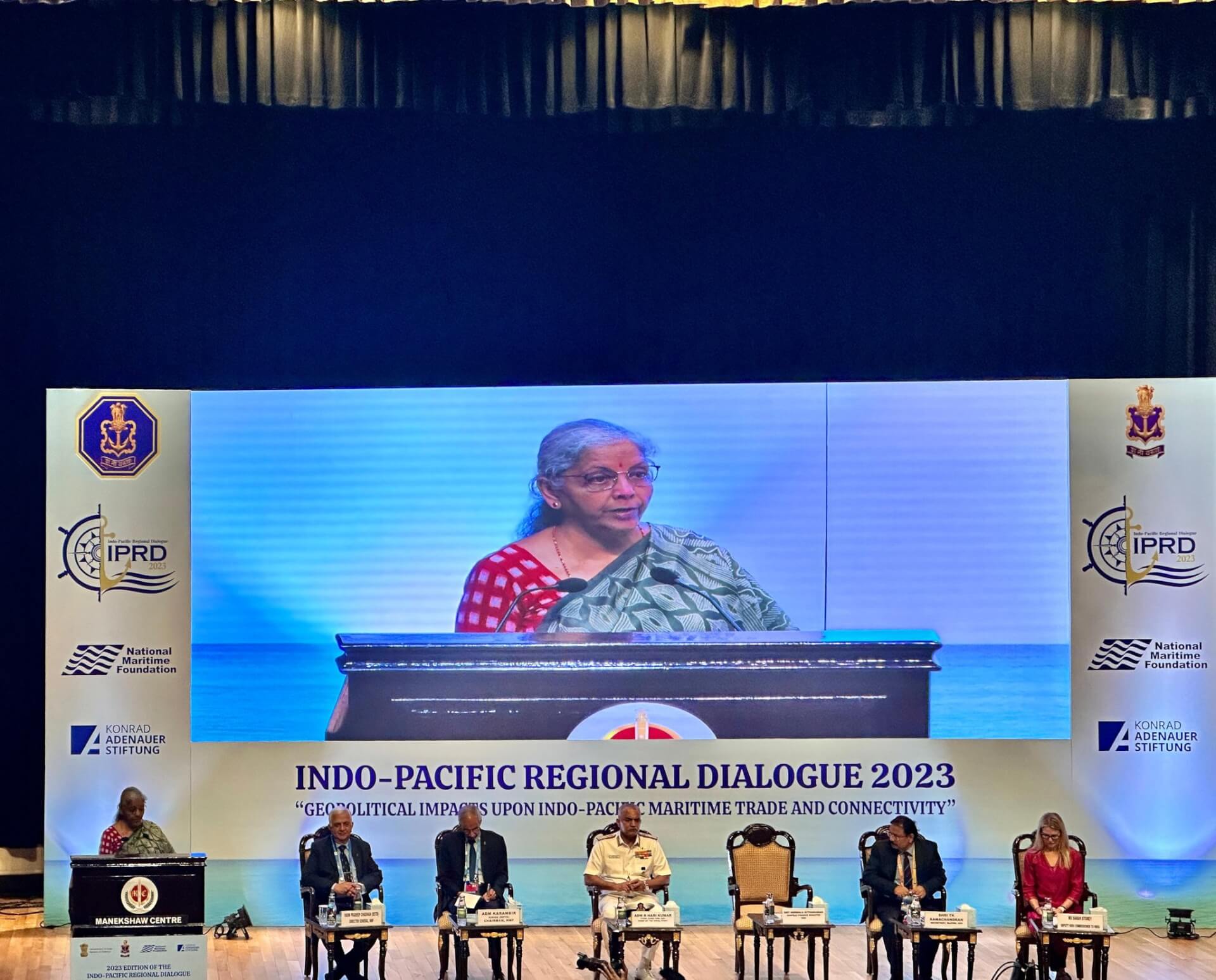At the Indo-Pacific Regional Dialogue 2023 (IPRD-2023), Indian Finance Minister (FM) Nirmala Sitharaman said that the India-Middle-East-Europe Economic Corridor (IMEC) was a “win-win situation” for all nations involved, but it was not without any geopolitical challenges.
The three-day annual apex-level regional strategic dialogue of the Indian Navy commenced on 15 November in New Delhi, with Vice President (VP) Jagdeep Dhankhar as the chief guest and Sitharaman delivering the special address.
IMEC a “Win-Win” for All
The Indian FM stressed the importance of maritime connectivity in India’s economic development and highlighted the key aspects of the IMEC, which was announced at the G20 Summit in New Delhi earlier this year.
We are determined to adhere to our principle of ‘leaving no one behind’, whether at a national level or a regional one. This is why India’s maritime policy is perfectly encapsulated in the acronym ‘SAGAR’, which expands to Security and Growth for All in the Region.
— Nirmala Sitharaman Office (@nsitharamanoffc) November 15, 2023
We truly… pic.twitter.com/xQZR7q9Hfw
Sitharaman said that IMEC is “a multimodal economic corridor that incorporates multiple networks of shipping, railways, and roadways and will also include electricity cables, high-speed data cables, and a hydrogen pipeline.”
While appreciating the project, she mentioned that the initiative had geopolitical challenges like the ongoing conflict in Gaza, which was a “worrying manifestation” of these challenges.
Sitharaman stated that the IMEC would create a reliable and cost-effective cross-border, ship-to-rail transit network to supplement existing maritime and road transport.
She outlined that the corridor will “facilitate trade and connectivity, leading to the economic integration of South Asia, West Asia, Europe, and the Middle East.”
Indian Growth Should Not be at Others’ Expense
In her address, the FM highlighted that India’s ‘blue economy,’ accounting for roughly 4 per cent of the country’s GDP, represents a “sea of opportunities.”
She further underscored the government’s plans to “position India as a hub in new and diversified supply and value chains across the Indo-Pacific.”
“We are entirely conscious of the fact that, over the foreseeable future, India’s comprehensive national power is going to remain inextricably linked to the ocean,” she added.
Sitharaman also underlined that India believes its economic growth should not be at the expense of others.
“If we are to grow in an environment of peace, security, and stability, the growth and security of others in our region must also grow,” she asserted.
Free and Peaceful Indo-Pacific Region
“As the fastest-growing economy, India seeks a free and peaceful rule-based Indo-Pacific region with an open and unrestricted flow of legitimate commerce,” Indian VP Dhankhar mentioned in his address.
The VP emphasised that freedom of navigation and over-flight facilities were critical under the established international laws and conventions.
He also acknowledged that the seas were emerging as the new frontier for global contestation due to their vast unexplored economic potential. “We seek a just global regulatory regime that respects the right over Exclusive Economic Zone, for the sustainable and equitable exploitation of marine resources and seabed in high seas,” Dhankhar said.
The sea is a source of immense unexploited wealth- marine resources, petroleum reserves, critical Rare Earths elements!
— Vice President of India (@VPIndia) November 15, 2023
This makes seas the new frontier for contestation among global players.
To contain the possibility of contesting claims of the seas and their assets, we need… pic.twitter.com/xC6BbdCaph
Noting the need for cooperation among countries, the VP said, “collaborative security and innovative partnerships were the way forward in ensuring a peaceful and prosperous region.”
Additionally, he called for a strategy to fortify the position of India as a ready and relevant stakeholder among nations in the region.
IPRD
The IPRD is being organised by the Indian Navy, with the National Maritime Foundation as its knowledge partner.
This year’s IPRD theme is ‘Geopolitical Impacts upon Maritime Connectivity.’
The opening day of the dialogue was attended by over 1,000 participants, including delegates from friendly foreign countries and international organisations.

